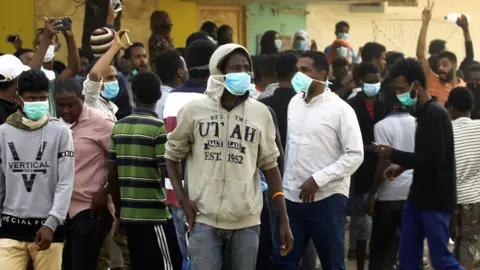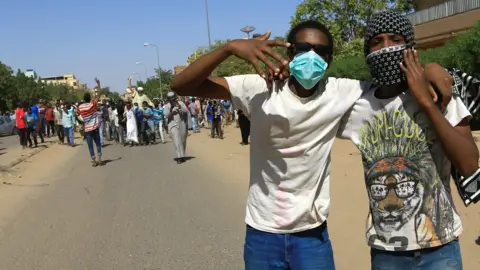'Why Sudan is shooting medics'
 Reuters
ReutersDoctors in Sudan are emerging as a leading force in a wave of anti-government protests, but they are paying a price for their defiance.
On Thursday, witnesses say a doctor was killed by the security forces amid demonstrations in the capital, Khartoum.
The protests began last month over the economic situation in the country but are now focused on removing long-time President Omar al-Bashir from office.
One medic, who requested anonymity, told the BBC's Newsday programme about the killing of his colleague and how doctors feel they have now become a target for the authorities:

It was a very sad day for us in Sudan, especially for doctors. A doctor was killed while he was trying to perform his duty. He was helping those injured in Buri, which is an area just near the Royal Care Hospital in the centre of Khartoum.
The witnesses that came with the doctor to the hospital told me what happened.
The doctor was trapped with some of the protesters inside a house in Buri. He was trying to provide medical care for them and the police forces tried to force them out of the house so they fired tear gas inside the house.
They couldn't stay inside anymore. So the doctor took a very brave stand.
He opened the door and he kept his hands held up high, trying to show them that he was coming out peacefully and he asked them if he could approach them just to talk to them.
Surprisingly they agreed and they said, "OK you can keep approaching us, we're ready to talk to you."
When he came close, he started explaining that he was a medical doctor and he was trying to provide medical care for the injured inside, that five people were injured and he was the only doctor in the house.
The response he got was: "You are a medical doctor, well we are looking for you." And they took two steps back and they just fired at him.
They killed him with such brutality. They just didn't care. They just shot him and then went away.
It's a very sad situation.

Read more:

We, as medical doctors, feel that our lives are in danger every day.
On Thursday, our small community of doctors told us that whenever we are on the street, whenever we are helping people, and even if we are doing our daily activities, we should never mention to any police officers or national security members or that we are medical doctors because they are trying to eradicate any medical doctor.
They are focusing on us because the medical doctors are now leading nationwide strikes. The people started the protests, but when the police became violent the doctors rose up to lead the protests.

Doctors under attack:
- A doctor was shot dead after witnesses said he identified himself to security services as a medic on Thursday
- Security forces have attacked hospitals with tear gas and live ammunition, says the Sudan Doctors' Syndicate (SDS)
- A general manager of Tuga private hospital was arrested in Khartoum earlier this month after saying they would treat protesters free of charge.
- This is in addition to at least 11 other doctors the SDS list as arrested, including its leaders
- Medical student Hassan Omer was left quadriplegic after being shot through the neck on 25 December during a protest, reports the British Medical Journal
- Dr Alaa Nugdallah, the head of the Sudanese Surgeons' Association, was arrested on 14 January at his office in Khartoum. The association had issued a statement on 13 January warning of a nationwide strike if detained doctors were not released in 24 hours, reports Human Rights Watch
- Surgical registrar Sabir Mohamed Ahmed was shot through the thigh during a protest on 25 December.

In the Sudanese community doctors are well respected because they tend to be people who were recognised as being intelligent and given education.
Now we are trying to persuade people to protest through civil disobedience - so to stay at home, don't go to work, don't go anywhere.
We've become a threat to the government.
We know that there are threats but there is still a lot we can do as doctors. We're very determined to keep doing our jobs.
 Reuters
ReutersI really believe that there is no turning back from what's happening in Sudan.
We've seen people die, we've seen people in their twenties sustain permanent disabilities and still insisting that freedom is more important than life lived in fear.
As it is becoming a threat to practise medicine in Sudan, this means eventually we are going to end up stopping working and turn all our efforts into protecting or treating the protesters in the streets.
